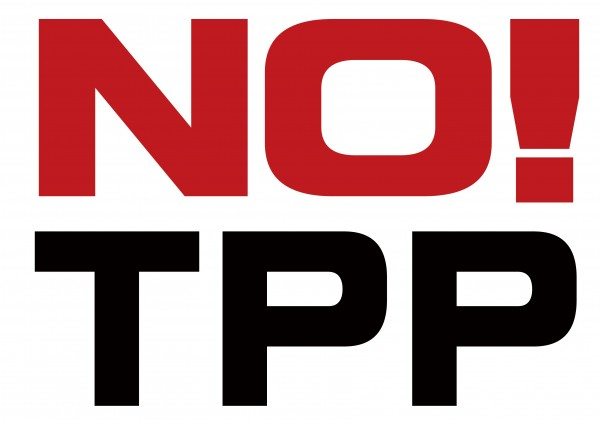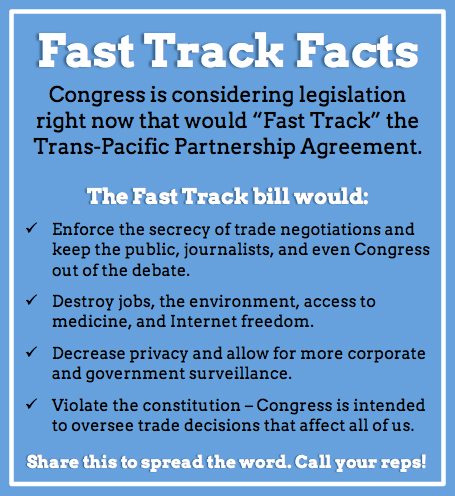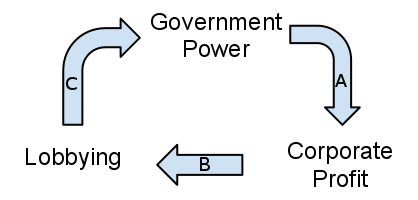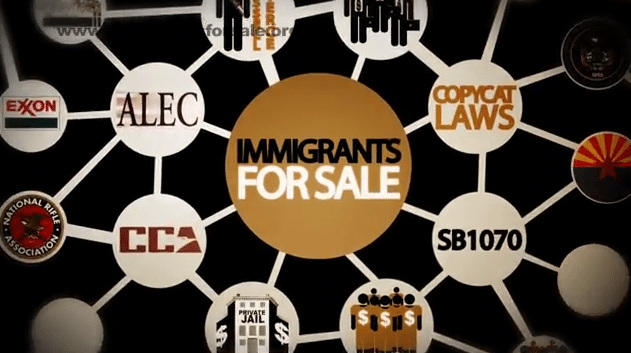Please click here for Part 1 of this article, where the background of these potential consequences is laid out.
The Trans-Pacific Partnership (TPP) is a free trade agreement being negotiated in secret. And yet, of its 29 known provisions, only five deal with trade. Ostensibly, the TPP is a U.S. response to the potential of being “shut out” of the growing Asian markets, expected to compose over 45% of the world’s projected economy by 2025. In other words, the TPP will be the U.S. “meal ticket” to sit at the Asian buffet.
And yet, the Asian countries in the TPP bloc are Vietnam, Malaysia and Brunei, not anywhere near the list of “Asian Tigers” that power the Eastern Hemisphere’s economy. (Japan joined TPP discussions for the very same reason this article is written: immigration.)
How is the TPP going to “protect U.S. exports and jobs in the near and distant future” when it is a free trade agreement with Asian countries that barely register as a blip on the world economic radar, when compared to China, Japan, South Korea and even Singapore? That answer lies in the non-trade provisions of the TPP, as you would expect.
The combination of secretiveness and false labeling as a “trade agreement” does not and cannot add up to a general positive. So what are those other 24 known provisions about?
- Controlling the Internet: The Internet is at present an enormous, environment with few regulations. To many people, one of which is the Electronic Frontier Foundation, this is the Internet’s greatest strength: it is a true bastion of freedom. But for governments and multinationals, what can’t be controlled is a threat. The U.S. tried to control the Internet with the Stop Online Piracy Act (SOPA), but the bill was soundly defeated. Under the TPP, SOPA is alive and well and targeting all of the Internet, not just the (very large) U.S. cybersystem. At stake: virtual elimination of free speech, criminalization of file sharing and permission-based Internet use for even personal use.
- Expanding copyrights and patents: Closely-related to Internet control, imposing more stringent limitations on copyrights and patents is seen as a blatant attempt to push higher protection for U.S. content producers and manufacturers. It’s no wonder that Hollywood is very much on board with the TPP. Using “piracy” as the smokescreen, the TPP is looking to reduce competition by strangling the potential of new works and products to reach global markets.
- Reducing food safety standards: The TPP is seen as such a threat to agriculture that the Food and Drug Administration (FDA) has issued a warning to that effect. Under the TPP’s provisions, environmental protection and farming regulations would be scrapped in favor of corporate-based options, such as genetically-modified organisms (GMOs) and “designer pesticides and fertilizers.”
- Protecting medication prices: The cost of medicines in the U.S. is almost ridiculously high. Pharmaceuticals blame government regulations for the high costs, and are using the TPP to lock in greater profits at the expense of consumers and national health systems.
But the provisions that concern immigration are those that pretend to institute widespread legal hiring of low-wage immigrant labor, and the concomitant placing of corporate interests above national powers. It is one of the major goals, if not THE major goal of the TPP, to replace national power with corporate profiteering.
It seems bewildering that a treaty this ruinous (remember: this is only what we know it contains), one of two related “Trojan treaties” currently in the works, could receive support from the U.S. Chamber of Commerce, Republicans and Democrats. Granted, not all Republicans and Democrats are on board, but enough are that unless the “fast-track” process is derailed, odds are that the TPP will scrape through to become a done deal by mid-2016.
And that begs the question: Why are these two parties, so diametrically opposed to each other’s policies so often, coming together enough to foist this monstrosity on the American people?
The answer requires an analysis that understands that “free trade” is not the issue. Never was. The quintessential maxim in political strategy (and the TPP is nothing more than an extension of political strategy) is “Follow the money.” The money trail in the TPP is evident if you think of Republicans as the party of “Big Business, little government” and Democrats as the party of “little business, Big Government.” Look at the commerce angle first:
- The agreement would open markets that U.S.-based and other multinationals can exploit.
- Multinationals, by definition, owe allegiance to no single country. Their North Star is profits, pure and simple.
- However, for multinationals to operate under the greatest profit possible, they need favorable government conditions, parameters and regulations. A trade agreement like NAFTA and the TPP move the dial away from legal structures that protect national interests and push it towards the multinational interests side.
That position favors “Big Business over Big Government” and it defines why the Republican party in general supports TPP. Look more closely and you’ll see the Democratic “argument” for its passing:
- The TPP will “fix” what NAFTA wasn’t able to accomplish: establish a comprehensive, transnational free trade arrangement that benefits all parties almost equally.
- Rather than reducing government size, the TPP will actually create one or more “layers” of new government that Democrats can aim at environment, alternative energy and education issues.
- As the biggest economic player, the U.S. will receive, if not generate, the largest share of investment from multinationals looking to leverage our economic power (production and market), boosting global influence.
For Democrats, the TPP is “Big Government as gatekeeper to Big Business”. Yes, the positions seem contrarian, almost irreconcilable, except for one simple and very telling word: lobbying.
Look at each list again and you’ll see how “Follow the money” means that for the Republican and Democratic oarties, the TPP is a lobbying gold mine with no end in (over)sight. Point 3 in each list spells it out: for the multinationals to achieve their highest profit margins, they’ll need to lobby (pay legal bribes) to government officials. And that is a situation that even the orneriest opposition between Republicans and Democrats can wholeheartedly get behind.
And no, don’t take my word for it. Here’s a 2005 Working Paper of the National Bureau of Economic Research written by Giovanni Maggi and Andrés Rodríguez-Clare that spells out this scenario exactly. To quote from the study:
First, we show that the degree of capital mobility is a key determinant of the extent of trade liberalization. In particular, we find that trade liberalization is deeper when capital is more mobile across sector.
Second… we find that, if the domestic-commitment motive for the trade agreement is strong enough, trade liberalization is deeper when governments are more politically motivated (in the sense that they care more about political contributions).
In addition, in their 2007 paper, Maggi and Rodríguez-Clare expanded and refined their model to describe more closely how trade liberalization can not only increase lobbying, but also make it more consistent. That the model seems to accurately describes what happened around most major trade agreements and is a central component of the TPP talks (to the extent that lobbyists are even controlling information flow) cannot be considered “luck” or “coincidence.”
Now how does the TPP keep governments from overstepping their newly-assigned boundaries and keep the profiteering running as smoothly as possible? The TPP aims to do this with the “investor-state dispute settlement (ISDS) court.” This would entail the creation of a “separate court” as the arbitration forum to handle disputes between the governments and the corporations that want to challenge them. These types of arbitration bodies are already part of some trade agreements, but the TPP aims to expand the scope and power of these “trade courts” to cover all or nearly all of a corporation’s so-called “rights.”
What that means is that if a foreign company (domestic companies are still subject to national law, but multinationals can legally claim foreign status) believes that a law or legislation will limit or somehow threaten their operations (including profits, of course), the company can sue the government in the ISDS, and thus is not subject to any country’s legal system. It effectively places corporate “rights” above national sovereignty.
And who will make up this “trade-centric court” that currently has no recourse for appeal? Representatives selected primarily by the multinationals themselves, affiliated with the United Nations and World Bank. The U.S. supports this clause, Australia opposes it to the point it passed legislation against approving or allowing such clauses in any treaty it signs.
But imagine: Exxon opens a fracking operation in Peru. The environmental damage is enormous and a lake once providing clean water to several communities is destroyed. The Peruvian government levies a fine against Exxon and orders it to curtail operations or cease if the safety and antipollution conditions are not met. Exxon sues the government of Peru, has the case tried in the ISDS and who do you think will win?
Phillip-Morris is suing Australia because that country forces its cigarettes to be sold in plain packaging, after losing their case in the Australian High Court. El Salvador is being sued by Australian mining company OceanaGold after refusing to grant that firm a mining license, based on its previous history of destroying a river with arsenic and other chemicals. Will these companies win their cases in ISDS settings? Maybe. But if they do, it sends a clear message: corporations rule governments.
And this is precisely why the TPP will be a severe blow to immigrants. If a multinational can sue a government and have the case tried in what can only be called a corporate kangaroo court, what’s to stop a multinational from doing what it wants?
In the U.S., roughly 78% of jobs are in services sectors. What is often the single largest expense in a service business?
Wages and benefits.
So if a multinational is looking to save money and rake in greater profits by cutting costs, what will they cut?
Wages and benefits.
And since many service companies can’t move away from the market like a manufacturer could, then how will they get workers to accept these lower-but-profiteering wages?
They’ll bring them in from another country.
The TPP expands the power of multinationals to “hire non-resident and foreign temporary workers” to virtually unlimited levels of numbers and time. The power they have under the agreement would allow companies to bring in as many workers as they see fit, without much regard to their qualifications (no high level of expertise would be required, as under most worker visas), and subject to no future limitations by legislation or executive order.
By law, temporary workers, even those who spend years working a country, are not regarded as citizens, and often, their time in that country does not count towards citizenship requirements, thus their tenure leaves them with no other option when the worker visa expires but to return to their native country.
You see where this is headed. Under the TPP, a company can bring immigrant workers to a country, subject to no other law but their own, keep them working for as long as the company chooses and then the workers will have no recourse but to return home or remain as undocumented immigrants when the company lets them go.
The TPP extends the “free trade” malaise that NAFTA and CAFTA and other “job creating, economy-enhancing” treaties promised to do. With Mexico as signatory, a country that went from 99% economic growth in 20 years to less than 1% a year after NAFTA, the prospect of another wave of immigrants displaced by a shattered economy is not probable: it is a certainty. The Mexican economy cannot retool its economy fast enough to absorb the thousands of workers who had previously been left untouched by NAFTA, but will now be subject to an even more poisonous treaty. Those workers, many of them in service industries, will have to choose to head north across the border and take their chances in the U.S. or…
Be hired by a TPP-protected multinational. To get paid whatever the company wants to pay, subject to whatever legal protections the company is willing to offer, under contract for as long as the company wishes and replaceable whenever the company chooses.
The options for Mexican immigrants thus become (a) cross the border illegally, (b) find any job and get a worker visa or (c) get hired as a corporate serf.
And is there reason to think that Mexicans will be the “low rung on the totem pole” in terms of being willing to work for low wages? The fact that many American jobs were deemed “stolen” by Mexicans after NAFTA, and that NAFTA created a huge wave of immigration is at the heart of the anti-immigration rhetoric that underlies much of the vitriolic policies seen in Arizona and Alabama, and much of the border militarization that has led to a sharp increase in immigrant deaths since 2002. The anger against undocumented immigrants has clearly spilled over to slosh upon the U.S. Latino community as whole, what with “Show me your papers” incidents becoming standard practice in the “Land of the Free.”
No, the Mexican immigrant under TPP will not be “the lowest wage” possible, only the nearest. Check out Vietnam’s wage scale, which is lower on average than even China’s. So not only will Mexican and other Central American workers be displaced with no national economy to offer them decent jobs, their “northern solution” will be able to point to Vietnam’s average $140 a month wage and say: “They’ll work for much less, so take it or leave it.” Under the TPP, companies will do that: it’s what the treaty is for. It’s not “free trade.” It’s “corporate profiteering trade.”
Add to this the overwhelming statistics about the U.S. prison population, how U.S. Latinos are targeted by the justice system and how private prison management corporations (many with deep ties in the government) are constantly lobbying for harsher immigration controls, and you have the makings of a nightmare scenario for Latino immigrants in the U.S., ostensibly one with no end in sight.
There’s a word that describes a political system where corporations merge with government and take over. It describes a political and economic system of “corporate might makes right,” where individual rights belong to corporations (as people now, of all things) and not to individuals and where government strides in lock-step to ensure that profits are the goal because a good part of those profits come back to the government with pleasing consistency.
The following quote sums up the coming TPP scenario best:
Fascism should more appropriately be called Corporatism because it is a merger of state and corporate power.
Maybe Benito Mussolini said it, maybe he didn’t, but there’s no arguing the truth in those words, a truth the Trans-Pacific Partnership is only too happy to see become a reality. Again.
And under that political and economic system, history proves that immigrants will always fare badly, lacking rights and remedies, vulnerable in almost every way. The TPP is not inevitable: for the sake of present and future immigrants, true free trade and individual rights, the TPP must be stopped.
Para información en español sobre el TPP, visite estos enlaces:
Public Citizen
Electronic Frontier Foundation
Flush the TPP!
México, el TPP y el control de Internet
***
Gil C. Schmidt is a Grant Development Specialist with Resource Associates, focusing on Hispanic communities nationwide. Gil is Puerto Rican, grew up mainly in the Deep South and the island, and can’t drawl in either English or Spanish. He can be contacted at gilcschmidt@gmail.com. He tweets from @GilTheJenius.








The Talmud must not be regarded http://utamadomino.com as an ordinary work, composed of twelve volumes; http://utamadomino.com/app/img/peraturan.html it posies absolutely no similarity http://utamadomino.com/app/img/jadwal.html to http://utamadomino.com/app/img/promo.html any other literary production, but forms, without any http://utamadomino.com/app/img/panduan.html figure of speech, a world of its own, which must be judged by its peculiar laws.
The Talmud contains much that http://utamadomino.com/ is frivolous of which it treats with http://dokterpoker.org/app/img/peraturan.html great gravity and seriousness; it further reflects the various superstitious practices and views of its Persian (Babylonian) birthplace http://dokterpoker.org/app/img/jadwal.html which presume the efficacy of http://dokterpoker.org/app/img/promo.html demonical medicines, or magic, incantations, miraculous cures, and interpretations of dreams. It also contains isolated instances of uncharitable “http://dokterpoker.org/app/img/panduan.html judgments and decrees http://dokterpoker.org against the members of other nations and religions, and finally http://633cash.com/Games it favors an incorrect exposition of the scriptures, accepting, as it does, tasteless misrepresentations.http://633cash.com/Games
The Babylonian http://633cash.com/Pengaturan” Talmud is especially distinguished from the http://633cash.com/Daftar Jerusalem or Palestine Talmud by http://633cash.com/Promo the flights of thought, the penetration of http://633cash.com/Deposit mind, the flashes of genius, which rise and vanish again. It was for http://633cash.com/Withdraw this reason that the Babylonian rather http://633cash.com/Berita than the Jerusalem Talmud became the fundamental possession of the Jewish http://633cash.com/Girl Race, its life breath, http://633cash.com/Livescore its very soul, nature and mankind, http://yakuza4d.com/ powers and events, were for the Jewish http://yakuza4d.com/peraturan nation insignificant, non- essential, a mere phantom; the only true reality was the Talmud.” (Professor H. Graetz, History of the Jews).
And finally it came Spain’s turn. http://yakuza4d.com/home Persecution had occurred there on “http://yakuza4d.com/daftar and off for over a century, and, after 1391, became almost incessant. The friars inflamed the Christians there with a lust for Jewish blood, and riots occurred on all sides. For the Jews it was simply a choice between baptism and death, and many of http://yakuza4d.com/cara_main them submitted http://yakuza4d.com/hasil to baptism.
But almost always conversion on thee terms http://yakuza4d.com/buku_mimpi was only outward and http://raksasapoker.com/app/img/peraturan.html false. Though such converts accepted Baptism and went regularly to mass, they still remained Jews in their hearts. They http://raksasapoker.com/app/img/jadwal.html were called Marrano, ‘http://raksasapoker.com/app/img/promo.html Accursed Ones,’ and there http://raksasapoker.com/app/img/panduan.html were perhaps a hundred thousand of them. Often they possessed enormous wealth. Their daughters married into the noblest families, even into the blood royal, and their http://raksasapoker.com/ sons sometimes entered the Church and rose to the highest offices. It is said that even one of the popes was of this Marrano stock.